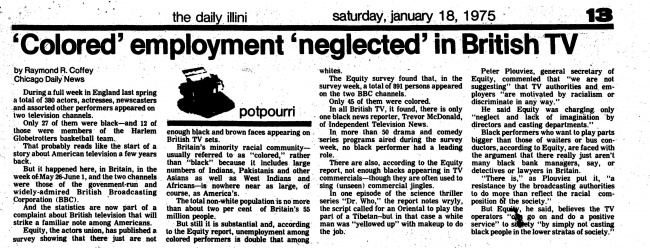Colored employment neglected in British TV
- Publication: The Daily Illini
- Date: 1975-01-18
- Author: Raymond R. Coffey
- Page: 13
- Language: English
During a full week in England last spring a total of 380 actors, actresses, newscasters .and assorted other performers appeared on two television channels.
Only 27 of them were black—and 12' of those were members of the Harlem Globetrotters basketball team.
That probably reads like the start of a story-about American television a few years back.
But it happened here, in Britain, in the week of May 26-June 1, and the two channels were those of the govenment-run and widely-admired British Broadcasting Corporation (BBC).
And the statistics are now part of a complaint about British television that will strike a familiar note among Americans.
Equity, the actors union, has published a survey showing that there just are not enough black and brown faces appearing on British TV sets.
Britain's minority racial community—usually referred to as "colored," rather than "black" because it includes large numbers of Indians, Pakistanis and other Asians as well as West Indians and Africans—is nowhere near as large, Of course, as America's.
The total non-white population is no more than about two per cent of Britain's 55 million people.
But still it is substantial and, according to the Equity report, unemployment among colored performers is double that among whites.
The Equity survey found that, in the survey week, a total of 891 persons appeared on the two BBC channels.
Only 45 of them were colored.
In all British TV, it found, there is only - one black news reporter, Trevor McDonald, of Independent Television News.
In more than 50 drama and comedy series programs aired during the survey week, no black performer had a leading role.
There are also, according to the Equity report, not enough blacks appearing in TV commercials—though they are often used to sing (unseen) commercial jingles.
In one episode of the science thriller series "Dr. Who," the report notes wryly, the script called for an Oriental to play the part of a Tibetan—but in that case a white man was "yellowed up" with makeup to do the job.
Peter Plouviez, general secretary of Equity, commented that "we are not suggesting" that TV authorities and employers "are motivated by racialism or discriminate in any way."
He said Equity was charging. only "neglect and lack of imaginition by directors and casting departments."
Black performers who want to play parts bigger than those of waiters or bus conductors, according to Equity, are faced with the argument that there really just aren't many black bank managers, say, or detectives or lawyers in Britain.
"There is," as Plouviez put it, "a resistance by the broadcasting authorities to do more than reflect the racial composition a the society."
But Equity, he said, believes the TV operators "can go on and do a positive service" to society "by simply not casting black people in the lower strides of society."
Disclaimer: These citations are created on-the-fly using primitive parsing techniques. You should double-check all citations. Send feedback to whovian@cuttingsarchive.org
- APA 6th ed.: Coffey, Raymond R. (1975-01-18). Colored employment neglected in British TV. The Daily Illini p. 13.
- MLA 7th ed.: Coffey, Raymond R.. "Colored employment neglected in British TV." The Daily Illini [add city] 1975-01-18, 13. Print.
- Chicago 15th ed.: Coffey, Raymond R.. "Colored employment neglected in British TV." The Daily Illini, edition, sec., 1975-01-18
- Turabian: Coffey, Raymond R.. "Colored employment neglected in British TV." The Daily Illini, 1975-01-18, section, 13 edition.
- Wikipedia (this article): <ref>{{cite news| title=Colored employment neglected in British TV | url=http://cuttingsarchive.org/index.php/Colored_employment_neglected_in_British_TV | work=The Daily Illini | pages=13 | date=1975-01-18 | via=Doctor Who Cuttings Archive | accessdate=5 December 2025 }}</ref>
- Wikipedia (this page): <ref>{{cite web | title=Colored employment neglected in British TV | url=http://cuttingsarchive.org/index.php/Colored_employment_neglected_in_British_TV | work=Doctor Who Cuttings Archive | accessdate=5 December 2025}}</ref>
